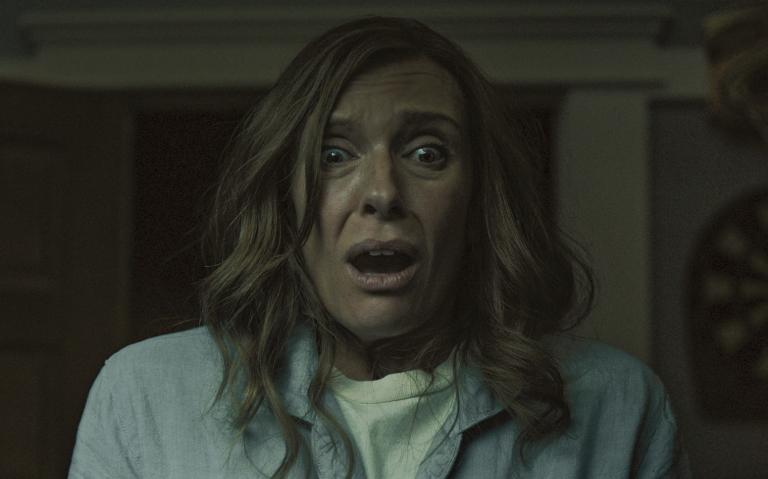By Christian Hamaker
The ecstatic reviews for Hereditary coming out of the Sundance and South by Southwest festivals heralded a new classic—a horror film of intense power with an unmissable lead performance from Toni Collette.
The pump had been primed. Weeks later, after A Quiet Place had reminded everyone of how well-made horror films could find a broad, appreciative audience, it looked as though Hereditary might draw a similar response from horror-hungry viewers.

Hereditary may do just that. But classic films are determined by their ability to stand the test of time and hold up to repeat viewings—and if Hereditary is a new classic of the genre, why do I never want to sit through it again?
Collette gives a remarkable performance as Annie Graham, an artist who, as the film opens, has recently lost her mother. During her eulogy, Annie bluntly acknowledges the distance between herself and her mom, who, Annie says, had “private rituals” that kept the two at a distance. At a grief recovery group, Annie meets a woman (Anne Dowd) who makes herself available to help comfort Annie, sensing Annie’s emotional and spiritual fragility. She on to something: Annie is about to encounter serious challenges to family stability and to her own sanity.
The mother-daughter legacy looms large in Annie’s life. Annie has some distance from her own daughter, Charlie (Millie Shapiro), whose furrowed expressions and audible clucking suggest she’s dealing with things that are weighing on her—things like visions of the dead and an interest in removing the heads of dead birds. Annie’s son, Peter (Alex Wolff), seems more like a typical kid his age, but after a harrowing tragedy—it’s truly horrifying—Annie and Alex come completely undone. (Annie’s husband, played by Gabriel Byrne, is largely inconsequential.)
Ensuing events take the film in a dark—very dark—direction that even the most jaded horror-film lovers may find oppressive and smothering in its despair. The story, which balances this-worldly horrors with suggestions of the supernatural, tips sharply in one direction during its corker of a conclusion. The well-constructed closing moments push the bounds of believability while simultaneously feeling inevitable—quite a feat for Writer/Director Ari Aster. In the cold, immediate aftermath of Hereditary, you may want to watch it again right away, to see how and when, exactly, the story reveals its hand toward its surprising finish. Or, like me, you may find that such considerations and speculations are not nearly enough to spur additional viewings.
Despite its pronounced strengths—chiefly a Collette performance that more than dips its toes into hysteria but somehow retains a relatability, even a sympathy, for Annie— Hereditary is permeated by a darkness that, while intentional and entirely effective, numbed me with its inciting incident and left me shaken, then depressed, by what I’d seen.
Why such a reaction? An interview with Aster by Michael Koresky sheds some light on Aster’s approach to faith and its relationship, or lack thereof, to Hereditary:
Koresky: Your film … implies that resolution might be the most horrific thing of all. The ending reminded me of The Last Temptation of Christ, and how just the phrase “It is accomplished” can be terrifying.
Aster: I had the same response to [Director Carl Theodore] Dreyer’s Ordet. That really bothers me. I don’t have faith, but that film, I feel it, and it’s upsetting because then I’m dropped back into my life, where I don’t really have a god. So I felt something there. But am I doomed?
Ordet recently has been on the lips of another filmmaker, Paul Schrader, who wrote about Dreyer’s film in his recently republished work Transcendental Style in Film. Schrader has mentioned Ordet in discussing the ending of his latest film, First Reformed, currently doing robust business on the arthouse circuit.
I can’t fault the filmmakers for my lack of desire to watch Hereditary again. But I also can’t bring myself to recommend it with any enthusiasm. This is a grim—very grim—movie, the taste for which I seem to have left behind.
Your mileage, as they say, may vary. You may find it the new classic that it’s being heralded as. Maybe, one day, I will too. But that day won’t be anytime soon.









